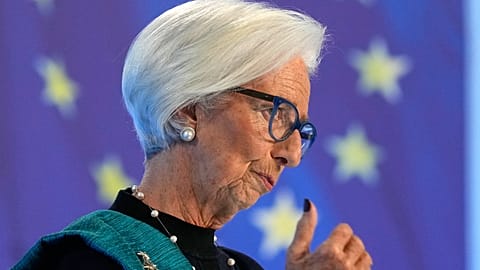Six years ago, his book "Capital in the 21st Century" sold 2.5 million copies after being translated into 40 languages. Arguably the most famous French economist in the world, Thomas Piketty is back with a controversial new book "Capital and Ideology".
Six years ago, his book "Capital in the 21st Century" sold 2.5 million copies after being translated into 40 languages. Arguably the most famous French economist in the world, Thomas Piketty is back with a controversial new book "Capital and Ideology". At over 1,200 pages, he continues to address economic inequalities, through a comparative and historical journey.
Euronews sat down to talk with Thomas Piketty.
EURONEWS: The financial crisis has increased frustration and resentment across Europe. Is the world we live in today particularly unequal?
THOMAS PIKETTY: We live in a world characterised by great disillusionment, where a fair economy is a possibility, an economic system that allows for a better distribution of wealth. I believe that this great disillusionment feeds identity fantasies, nationalistic in Europe, where there is a great misunderstanding between European countries, including between Germany, France and Italy, where everyone has the impression that everything is the fault of the others, and that if everyone did things like they did, everything would be fine. This is obviously wrong, because we have things that we have to build together. This mutual mistrust worries me a lot.
EURONEWS: Indeed, populist movements seem to be almost inevitable across the European Union and the rest of the world. How can we explain their successful rise? Are they posing relevant questions in comparison to the traditional parties?
THOMAS PIKETTY: The debates we have today on what is called populism - a box in which we sometimes put everything and anything - we can sometimes class as xenophobic speech. But sometimes it's economic discourse ostensibly free from constraint, such as constraint on public debt. So its incoherent to put all this in the same box, because in this case of the public debt for example, we can show that yes, often countries have freed themselves from constraints. For example Germany or Japan in the 50s drastically reduced their debt by exceptional taxes on the highest private inheritance, and it was a success, it was a great success. We can also point to very progressive forms of taxation on the highest incomes, the highest estates, that were applied in the United States between the 1930s and 1980s. So it's essential to look at the examples of history if we want to solve today's problems. If you have your nose stuck in the present and our certainties, then not only will we fail to solve anything but we also leave the door open to identity drifts. When you explain that we cannot change the economic system, that we can't reduce the inequalities between social classes, that states can do nothing more than control their borders, and their identities, then it is not surprising that in the end the debate will focus on issues of border security.
EURONEWS: A new European Commission will be set up led by Germany's Ursula Von der Leyen. She takes over from Luxembourg's Jean-Claude Juncker who stayed for five years in Brussels. What is your assessment of the five years under Jean-Claude Juncker?
THOMAS PIKETTY: I didn't expect great things, and it's true that on these issues, especially tax and social justice in Europe, there's just nothing, and that's very serious. Because what we have, is a divorce between the working class, the middle class and the construction of Europe, and more generally with globalisation. This separation has become very wide. I show this in my book. I examine the voting structure around the European Union. Take the Brexit vote - only 30 percent most favored in terms of income, education and heritage voted to stay in the European Union. The other 70 percent voted mainly to leave. You take the vote on the referendum on the Maastricht Treaty in 1992 in France, you have the same thing. You take the vote on the European Constitutional Treaty of 2005, you have the same thing. So when you have that in a quarter of a century in two countries considered very different in their attitudes towards Europe, when you have such marked social cleavage, I think we have to ask questions.
EURONEWS: So can we expect five more years of the same?
THOMAS PIKETTY: No, no because I always trust collective intelligence. I don't think we have to wait for the next financial or political crises, or the next Brexit-type referendum before acting. We can't wait until 28 countries (of the EU) become 27, and maybe 26 and 25. We can't wait until all this crumbles (falls apart).
EURONEWS: Do you think that Brexit can be a pandora's box and suddenly lead to other European Union exits despite the current difficulties?
THOMAS PIKETTY: I think that to imagine that Brexit is solely the responsibility of the British, and the narrow nationalism of the British would be a huge mistake. Brexit also reflects a European model that didn't work especially in the aftermath of the 2008 crisis. You know in 2012, 2013, when the euro area had fallen back into recession while the rest of the world stood up and that the United States had already emerged from the crisis of 2008. Well all that played into how the United Kingdom viewed the European Union, at the time, as a place it didn't want to be in. It was in this context that the referendum project developed, just as it was in this context that the referendum in Catalonia developed to get out of Spain. So we must move away from consistently saying, "all this is a misunderstanding, the middle and working classes will eventually understand". Another thing I see and hear gaining ground it France nowadays is that the popular classes are described as "incurable nationalists", "incurable racists." Besides, they've been voting for the National Rally or the National Front so we don't care. We, the privileged, decide policy because we know what's good. This is what I see happening in France today and it is an attitude that is setting us up for terrible developments in the future. We've got to get away from that.
EURONEWS: If the traditional Centre-left and Centre-right parties don't respond to the popular classes, is it the end of the European Union as we know it today."
THOMAS PIKETTY: It's either the end of the European Union with serial exits from the European Union or a takeover of the European Union by xenophobic and racist forces, which is already happening. When you have a European Commissioner for the protection of the European way of life, when you have tens of thousands of people who have died in the Mediterranean for ten years while Europe obviously has the means to be more welcoming, when you have a population of 520 million people, the richest space in the world, and you explain that it is impossible to take a million migrants a year, then we're not being rational. And so in a way we've already witnessed the takeover of the European Union by xenophobic discourse, which is something that is almost worse than the break-up (of the European Union) because at least you can re-build something that is broken. I wouldn't like to have to choose between the two options, so let's be positive. I'm more interested in finding solutions than worrying about what's not working. Solutions such as a Franco-German Assembly or Franco-German-Italian or Belgian assembly. To have a common policy of social investment, ecological investment, tax justice, and then to open such a project to all countries that want to join it. Designing it as a complement to the current European Union and certainly not by undoing it, but in addition. That's something possible.


















